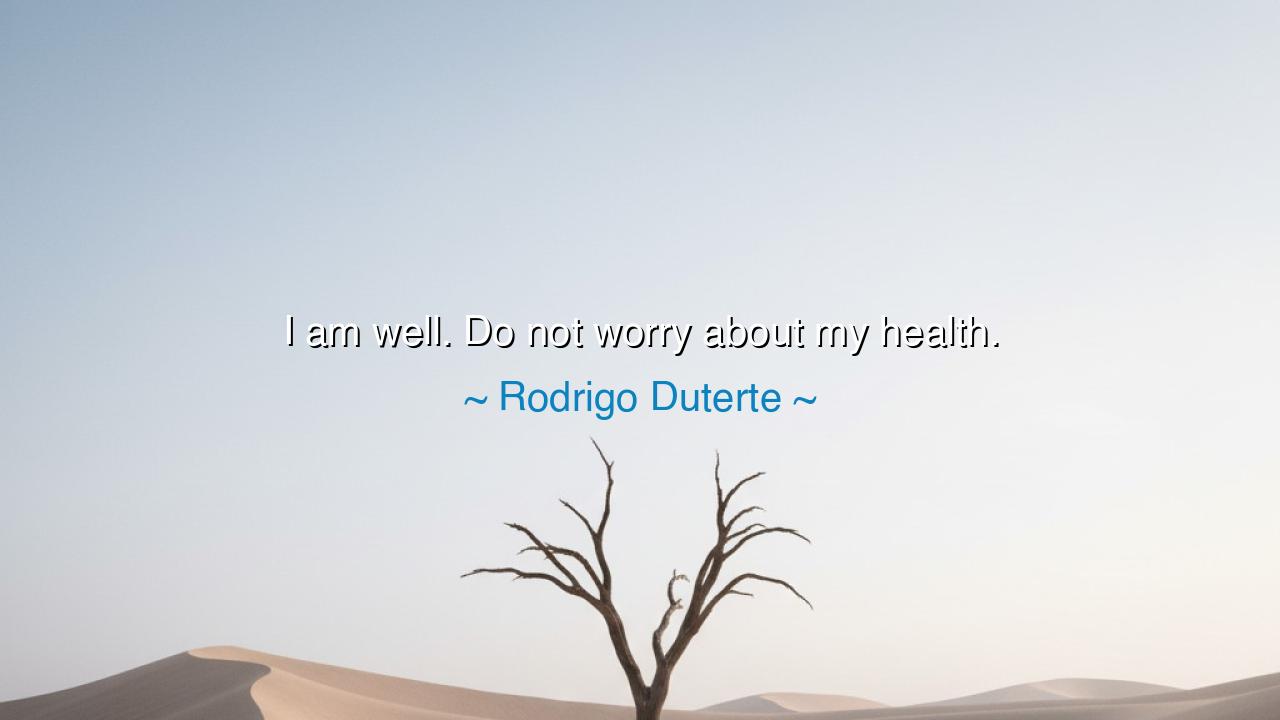
I am well. Do not worry about my health.






In the brief yet resolute words of Rodrigo Duterte, a man known for his bluntness and unyielding will, there echoes a truth deeper than the surface of his statement: “I am well. Do not worry about my health.” To the hurried ear, these words may seem a simple reassurance, the dismissal of concern from a leader to his people. Yet beneath them lies a profound meditation on strength, leadership, and the burden of public duty. They are not only words of defiance against frailty, but also a reflection of a leader’s desire to project calm in the face of turmoil — to say, in essence: the body may be tested, but the spirit remains unbroken.
In the ancient traditions of leadership, it was believed that the health of the ruler mirrored the health of the realm. When kings fell ill, empires trembled; when they stood tall, the people’s confidence rose with them. Thus, when Duterte uttered these words, he was not merely speaking of his physical state, but of something symbolic — the assurance that the ship remains steady, that the helm is firm, and that the storm, however fierce, shall be endured. It was a message to both friend and foe: Do not mistake silence for weakness, nor fatigue for defeat. In this, his words resonate with the timeless voices of rulers who, though weary in flesh, stood steadfast in spirit.
There is a story told of Winston Churchill, who during the darkest nights of the Second World War, would rise from his sickbed, wrapped in robe and resolve, to address his people. “We shall never surrender,” he declared, even as his own body bore the scars of exhaustion. His health, like Duterte’s, became the subject of endless speculation — yet his will became legend. For what sustains a leader in such hours is not mere vitality, but the unyielding determination to appear unbroken, that his people might find courage in his composure. Such moments reveal that strength of mind can defy the limitations of flesh, and that true wellness often begins not in the body, but in the conviction of the soul.
When Duterte says, “Do not worry about my health,” he speaks not only to his supporters, but to the universal anxiety that surrounds human fragility. In every era, the powerful and the humble alike fear the decay of the body. Yet his words remind us that to live well — to lead, to endure, to face the unrelenting tide of responsibility — one must learn to separate the weakness of the body from the resilience of the spirit. A man’s health may falter, but his purpose must not. In this, Duterte’s statement becomes both a shield and a declaration: I am more than my condition; I am the embodiment of will itself.
Still, we must not take these words as a denial of human limitation. The ancients taught that even heroes must rest, for the body is the vessel through which destiny flows. Alexander the Great, though unstoppable in conquest, succumbed to illness before his thirties — his empire stretching farther than his years could sustain. His ambition was vast, but his mortality reminded the world that even the greatest must bow before nature’s quiet power. Thus, Duterte’s words, while strong, also carry a quiet truth — that health, once lost, can humble the proudest of men. To be “well” is both a blessing and a choice: the constant tending of body, mind, and purpose.
Let the lesson, then, be twofold. First, learn from Duterte’s firmness — the courage to face the world without fear, to speak strength into existence when doubt surrounds you. But second, learn from history — that true wellness is not merely the denial of frailty, but the harmony between strength and humility. Care for your body, for it is the house of your will. But let your will, in turn, sustain your body — for no medicine is more powerful than a heart resolved to live with purpose.
And so, these simple words — “I am well. Do not worry about my health.” — become a mantra for endurance. They remind us that wellness is not the absence of pain, but the triumph over it. They call upon us to stand upright even when weary, to carry ourselves with dignity in the face of decay, and to reassure those who look to us for guidance that the flame still burns. For in every era, the world needs those who, even when bruised and burdened, can still speak with steadiness and faith: “I am well.” And by that utterance — whether it be true or willed into truth — they keep hope alive in others and strength alive in themselves.






AAdministratorAdministrator
Welcome, honored guests. Please leave a comment, we will respond soon